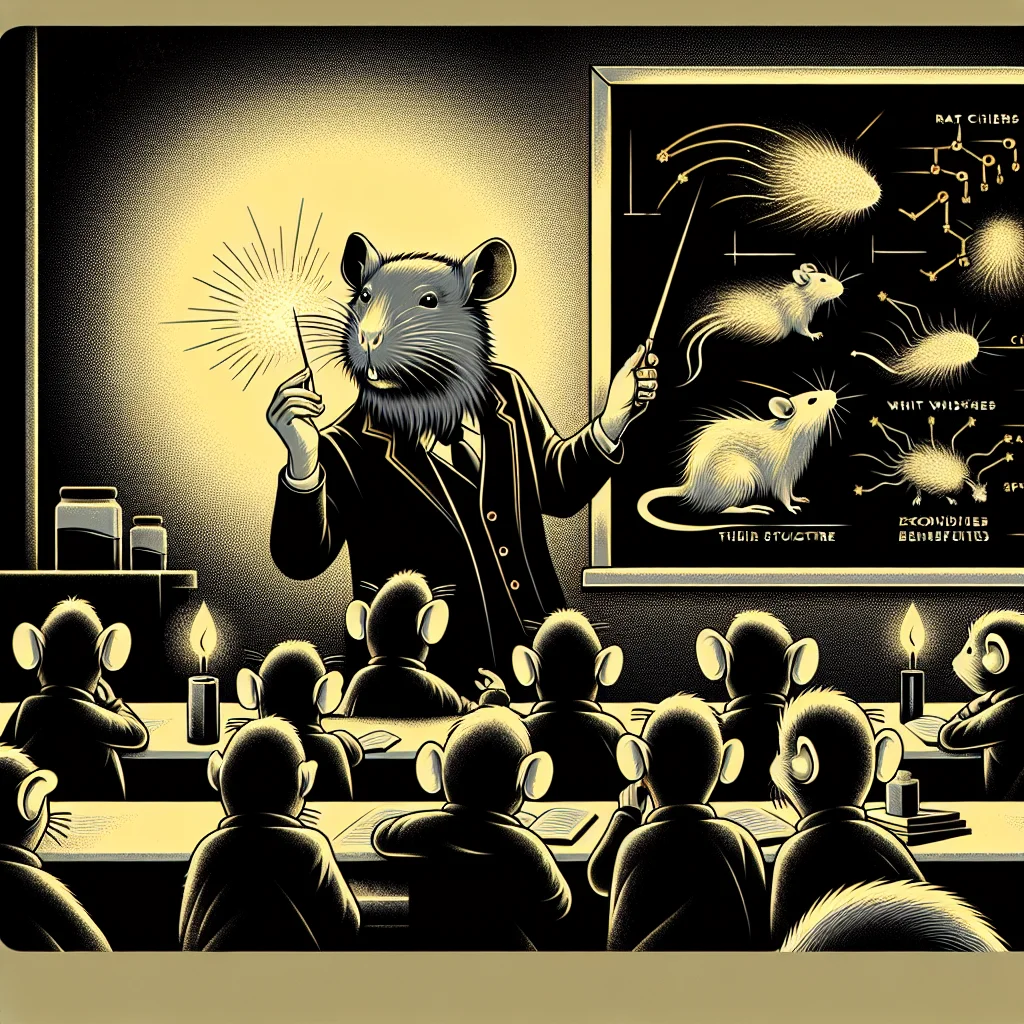3 minute read •
Comments
Ratopolis Introduces Mandatory Whisker Health Courses in Schools
April 3, 2025

In a pioneering move that promises to reshape the educational landscape of Ratopolis, select schools have recently introduced mandatory whisker health courses, aiming to enhance rat health and academic performance by tapping into the unique sensory capabilities that whiskers provide.
The core of a rat's interaction with the world is heavily influenced by their whiskers, serving as crucial tools for navigation, sensory perception, and even communication. This educational reform is not merely about grooming; it reflects a shift towards holistic education that recognizes the intertwined nature of health and learning.
The decision to incorporate whisker care into the curriculum emerged from extensive research and discussions among educators and policymakers. Experts predict that this initiative will not only help in preventing common health issues associated with poor whisker health but also improve learning outcomes by fostering sensory acuity, leading to increased focus and problem-solving skills.
Echoing this sentiment, Ratopolis High's principal, Mr. Tailton, observes, "Incorporating whisker care into our curriculum is a step forward in holistic education. It's not just about grooming; it's about grooming future leaders."
Early results show promise. Parents like Mrs. Squeakers noticed changes: "At first, I was skeptical, but seeing my little ones more confident and attentive in class has changed my mind. It's a whisker of genius!"
Yet, not everyone is on board. Critics raise concerns about resource allocation and the need for teacher training. Some argue that the emphasis on whisker care might detract from core subjects. Principal Tailton counters, noting the integrative nature of the program: "It's about enhancing what's already there."
Health expert Dr. Furris explains, "Proper whisker maintenance is linked to mental and physical well-being. Our trials show improved sensory capabilities can boost academic success." His studies have paved the way for other cities to rethink similar educational strategies.
Rodent students themselves are discovering newfound appreciation for their sensory abilities, with insights such as this from young student Pip Squeak: "I never knew my whiskers could do so much! Now, I feel like a superhero with super senses."
As Ratopolis embraces this innovative reform, it sets a precedent across the rat world in prioritizing a more comprehensive approach to education. Historical attempts at educational reform in Ratopolis have seen varying success; however, integrating essential life skills, like whisker care, into the curriculum may well be a defining moment.
In cities like Rattown and Cheddar City, similar initiatives point to significant long-term societal benefits, hinting at broader possibilities for Ratopolis. As we observe the results unfold, the questions remain: How will whisker care shape the future of education? And might this be a catalyst for a broader educational evolution?
Ratopolis stands at a crossroads, urging its citizens, educators, and policymakers to reflect on the balance between traditional and modern educational needs. As with any great leap forward, the road will be paved with challenges and triumphs. For us, the rats of Ratopolis, the time to ponder and act is now.
The core of a rat's interaction with the world is heavily influenced by their whiskers, serving as crucial tools for navigation, sensory perception, and even communication. This educational reform is not merely about grooming; it reflects a shift towards holistic education that recognizes the intertwined nature of health and learning.
The decision to incorporate whisker care into the curriculum emerged from extensive research and discussions among educators and policymakers. Experts predict that this initiative will not only help in preventing common health issues associated with poor whisker health but also improve learning outcomes by fostering sensory acuity, leading to increased focus and problem-solving skills.
Echoing this sentiment, Ratopolis High's principal, Mr. Tailton, observes, "Incorporating whisker care into our curriculum is a step forward in holistic education. It's not just about grooming; it's about grooming future leaders."
Early results show promise. Parents like Mrs. Squeakers noticed changes: "At first, I was skeptical, but seeing my little ones more confident and attentive in class has changed my mind. It's a whisker of genius!"
Yet, not everyone is on board. Critics raise concerns about resource allocation and the need for teacher training. Some argue that the emphasis on whisker care might detract from core subjects. Principal Tailton counters, noting the integrative nature of the program: "It's about enhancing what's already there."
Health expert Dr. Furris explains, "Proper whisker maintenance is linked to mental and physical well-being. Our trials show improved sensory capabilities can boost academic success." His studies have paved the way for other cities to rethink similar educational strategies.
Rodent students themselves are discovering newfound appreciation for their sensory abilities, with insights such as this from young student Pip Squeak: "I never knew my whiskers could do so much! Now, I feel like a superhero with super senses."
As Ratopolis embraces this innovative reform, it sets a precedent across the rat world in prioritizing a more comprehensive approach to education. Historical attempts at educational reform in Ratopolis have seen varying success; however, integrating essential life skills, like whisker care, into the curriculum may well be a defining moment.
In cities like Rattown and Cheddar City, similar initiatives point to significant long-term societal benefits, hinting at broader possibilities for Ratopolis. As we observe the results unfold, the questions remain: How will whisker care shape the future of education? And might this be a catalyst for a broader educational evolution?
Ratopolis stands at a crossroads, urging its citizens, educators, and policymakers to reflect on the balance between traditional and modern educational needs. As with any great leap forward, the road will be paved with challenges and triumphs. For us, the rats of Ratopolis, the time to ponder and act is now.
Comments